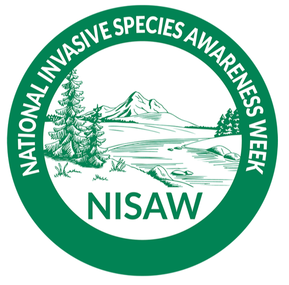 The annual National Invasive Species Awareness Week (NISAW) is held February 26 through March 3, 2024, which seeks to raise awareness about invasive species, the threat that they pose, and what can be done to prevent their spread. The term "invasive" is used for aggressive non-native species that spread and reproduce rapidly, displace native species, and cause major disturbance to the areas in which they are present. Invasive species can cause irreversible harm to the environment and the economy, and often pose a threat to plant, animal, and human health. When managing invasives, certain species and locations are prioritized over others. Early detection and rapid response should be used to find and eradicate new and emerging invasive species in a specific location. This method is much more effective than trying to control a widespread infestation of an established species. This type of effort is seen through the Spotted Lanternfly quarantine order in the state of Pennsylvania. When this invasive planthopper was discovered in Berks county in 2014, the PA Department of Agriculture introduced a quarantine to help stop the spread of the species to other areas of the state. To avoid spreading it to other areas not yet placed in quarantine (such as Venango county), certain regulated articles are prohibited from being moved from quarantined counties. These include firewood, nursery stock, packing materials (pallets), among others. While invasive species management has become all too common in Pennsylvania, it is important to remember that prevention is the most effective method of controlling invasive species. When boating, make sure to inspect and dry your boat, trailer, and other equipment to ensure that aquatic hitchhikers don’t spread to other bodies of water. Look for vegetation that may be in your live well or on your boat motor. When traveling, make sure to “look before you leave” by inspecting your vehicle and other outdoor equipment for egg masses laid by insects such as the spotted lanternfly. Want to get more involved with managing invasive species? Report your sightings! Download the iMapInvasives app or visit www.imapinvasives.org to start recording your observations of invasive species near you. Many organizations and agencies use this data to focus their management efforts. Several field guides such as the Plant Invaders of Mid-Atlantic Natural Areas and PA Field Guide to Aquatic Invasive Species are available.
0 Comments
Leave a Reply. |
CATEGORIESs
All
Archives
July 2024
|

